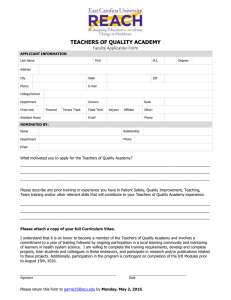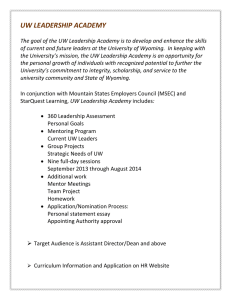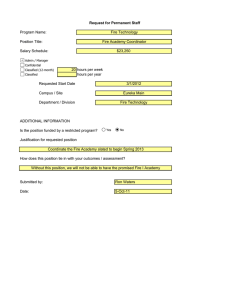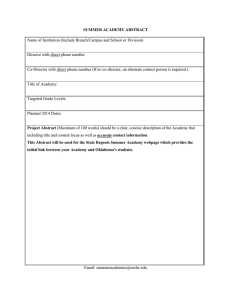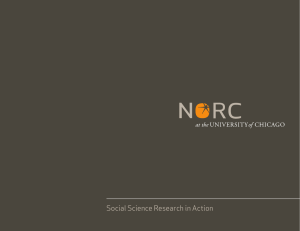Reflect, Then Prepare for a Career Outside the Academy
advertisement
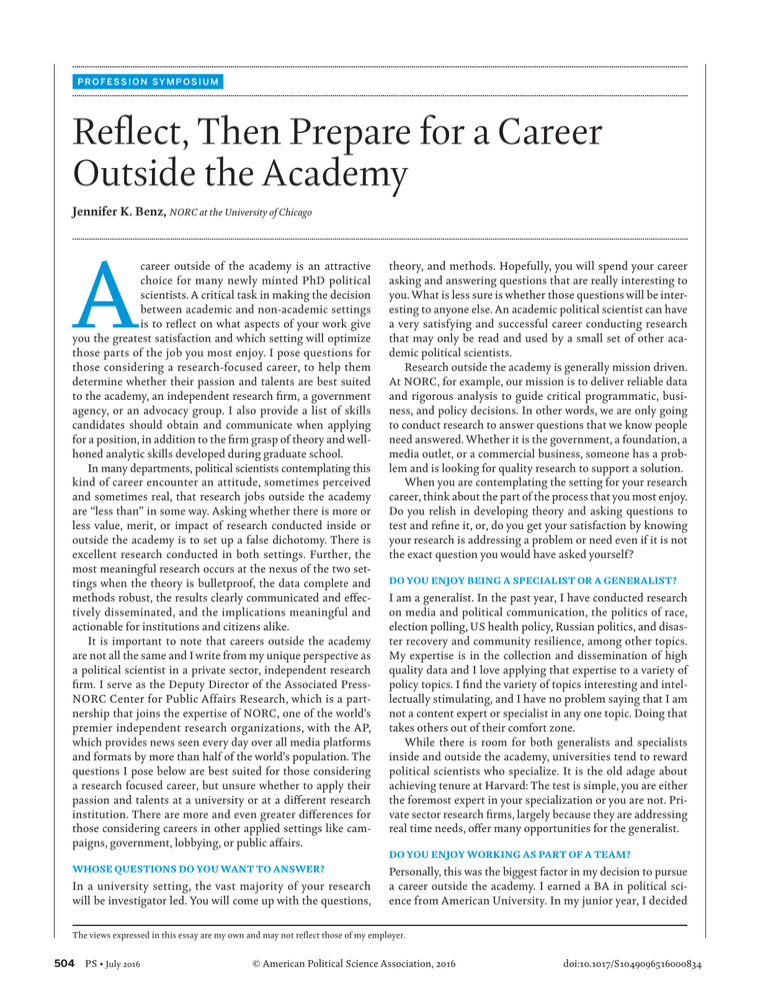
........................................................................................................................................................................................................................................................................................................ P R O F E S S I O N SY M P O S I U M ........................................................................................................................................................................................................................................................................................................ Reflect, Then Prepare for a Career Outside the Academy Jennifer K. Benz, NORC at the University of Chicago ........................................................................................................................................................................................................................................................................................................ A career outside of the academy is an attractive choice for many newly minted PhD political scientists. A critical task in making the decision between academic and non-academic settings is to reflect on what aspects of your work give you the greatest satisfaction and which setting will optimize those parts of the job you most enjoy. I pose questions for those considering a research-focused career, to help them determine whether their passion and talents are best suited to the academy, an independent research firm, a government agency, or an advocacy group. I also provide a list of skills candidates should obtain and communicate when applying for a position, in addition to the firm grasp of theory and wellhoned analytic skills developed during graduate school. In many departments, political scientists contemplating this kind of career encounter an attitude, sometimes perceived and sometimes real, that research jobs outside the academy are “less than” in some way. Asking whether there is more or less value, merit, or impact of research conducted inside or outside the academy is to set up a false dichotomy. There is excellent research conducted in both settings. Further, the most meaningful research occurs at the nexus of the two settings when the theory is bulletproof, the data complete and methods robust, the results clearly communicated and effectively disseminated, and the implications meaningful and actionable for institutions and citizens alike. It is important to note that careers outside the academy are not all the same and I write from my unique perspective as a political scientist in a private sector, independent research firm. I serve as the Deputy Director of the Associated PressNORC Center for Public Affairs Research, which is a partnership that joins the expertise of NORC, one of the world’s premier independent research organizations, with the AP, which provides news seen every day over all media platforms and formats by more than half of the world’s population. The questions I pose below are best suited for those considering a research focused career, but unsure whether to apply their passion and talents at a university or at a different research institution. There are more and even greater differences for those considering careers in other applied settings like campaigns, government, lobbying, or public affairs. theory, and methods. Hopefully, you will spend your career asking and answering questions that are really interesting to you. What is less sure is whether those questions will be interesting to anyone else. An academic political scientist can have a very satisfying and successful career conducting research that may only be read and used by a small set of other academic political scientists. Research outside the academy is generally mission driven. At NORC, for example, our mission is to deliver reliable data and rigorous analysis to guide critical programmatic, business, and policy decisions. In other words, we are only going to conduct research to answer questions that we know people need answered. Whether it is the government, a foundation, a media outlet, or a commercial business, someone has a problem and is looking for quality research to support a solution. When you are contemplating the setting for your research career, think about the part of the process that you most enjoy. Do you relish in developing theory and asking questions to test and refine it, or, do you get your satisfaction by knowing your research is addressing a problem or need even if it is not the exact question you would have asked yourself? DO YOU ENJOY BEING A SPECIALIST OR A GENERALIST? I am a generalist. In the past year, I have conducted research on media and political communication, the politics of race, election polling, US health policy, Russian politics, and disaster recovery and community resilience, among other topics. My expertise is in the collection and dissemination of high quality data and I love applying that expertise to a variety of policy topics. I find the variety of topics interesting and intellectually stimulating, and I have no problem saying that I am not a content expert or specialist in any one topic. Doing that takes others out of their comfort zone. While there is room for both generalists and specialists inside and outside the academy, universities tend to reward political scientists who specialize. It is the old adage about achieving tenure at Harvard: The test is simple, you are either the foremost expert in your specialization or you are not. Private sector research firms, largely because they are addressing real time needs, offer many opportunities for the generalist. DO YOU ENJOY WORKING AS PART OF A TEAM? WHOSE QUESTIONS DO YOU WANT TO ANSWER? In a university setting, the vast majority of your research will be investigator led. You will come up with the questions, Personally, this was the biggest factor in my decision to pursue a career outside the academy. I earned a BA in political science from American University. In my junior year, I decided The views expressed in this essay are my own and may not reflect those of my employer. 504 PS • July 2016 © American Political Science Association, 2016 doi:10.1017/S1049096516000834 ........................................................................................................................................................................................................................................................................................................ ........................................................................................................................................................................................................................................................................................................ I wanted to work in a newspaper’s polling unit. I had a passion for public opinion research and believed that the public’s attitudes and preferences could be carefully measured and should be part of the democratic process. I had a public opinion research internship at the American Enterprise Institute that further fueled my passion. That experience also provided contacts with leading media pollsters around the country— and every one of them warned me that large-scale research and polling units were some of the first causalities of contracting legacy news media. the classroom. I have several colleagues at NORC who have managed this successfully, but between work, family, and life, I have yet to return to the classroom. I do miss the classroom and encourage graduate students to think carefully about how important the role of professor is in their job satisfaction. Outside the university setting, mentorship is the closest thing to teaching. I am extremely fortunate to have excellent mentors and to be a mentor for some amazingly talented young researchers. There are many benefits to these relationships Further, the most meaningful research occurs at the nexus of the two settings when the theory is bulletproof, the data complete and methods robust, the results clearly communicated and effectively disseminated, and the implications meaningful and actionable for institutions and citizens alike. I was a young mother in addition to a graduating senior and pursuing a career in an unstable industry was simply not feasible. Instead, I pursued opportunities at private sector research firms. I had used the General Social Survey and other NORC surveys in my undergraduate research and was impressed with the quality of the research. I applied and was soon hired as a research assistant. There I worked on the survey research components of large public health and health care projects before pursuing my PhD in political science at UNC, Chapel Hill. Within weeks of arriving at graduate school, I was already missing the teamwork that came from conducting research at NORC. I was lucky to be in a collaborative department at UNC where graduate students had many opportunities to work on faculty projects. These interactions were valuable, productive, and fun, but they just did not stack up to the large project teams I had experienced at NORC. For me, there is something magical that happens when a large team comes together and works in concert on a shared objective. From journalists and editors to statisticians and policy experts to the survey operations and IT professionals, every team is multidisciplinary and includes a diverse set of skills, knowledge, and perspectives on the research. I firmly believe the insights that come from a well-functioning team improve the quality of the research. Building and leading those project teams is one of my favorite parts of the job and as far as I could tell, there was nothing analogous in a university setting. TEACHING VS. MENTORING On the other hand, there is no analogue to the professor– student relationship outside the university setting. I worked primarily as a research assistant during graduate school, but I thoroughly enjoyed my few opportunities to teach. I loved seeing the subject matter click for a student, building relationships with interested students, and watching their critical thinking and research skills develop. In deciding to go back to NORC, I told myself that I could also teach a course each year to keep myself connected to that are very satisfying in that they tend to be more personal and they tend to evolve but endure over a career. But, it is a fundamentally different relationship than professor and student. FINDING SUCCESS OUTSIDE THE ACADEMY For those who decide to start a career outside the academy, it is important to have and to communicate a different set of skills. I regularly lead the recruitment and hiring process for my team at NORC. In that capacity, I receive many CVs from candidates who went straight from undergraduate studies to a PhD program. I am more skeptical of these applicants who lack significant work experience and the associated nonresearch skills like project management, budgeting, supervising staff, and project communication. Below is a list of factors that I look for in a candidate, in addition to the firm grasp of theory and well-honed analytic skills developed during graduate school. Companies invest serious time and effort bringing in new PhD hires and training them, which means a new hire is a gamble. To minimize the risk, companies look for demonstrated experiences in the following areas: - Examples, beyond the classroom, of working with data and applying different methodologies. Real world data are complicated and messy and I want to know that the candidate has the creative thinking and the methodological abilities to find solutions. - The ability to communicate to different audiences, particularly non-academic or non-technical audiences. Writing for non-academic publications, public speaking, data visualization, journalism experience, white papers or briefing books—any concrete examples of synthesizing complicated research and communicating the key points to non-experts. - Experience working on a project team, or even better, leading and managing a task. Research is a process that requires management and oversight of many different people and tasks. Highlight any experience you have being PS • July 2016 505 ........................................................................................................................................................................................................................................................................................................ Profession Symposium: Careers Outside Academia ........................................................................................................................................................................................................................................................................................................ responsible for a budget, seeing a project through an institutional review board or Office of Management and Budget clearance process, developing a quality control protocol, serving as a liaison between the research team and the press or other stakeholders. - A passion for research and its potential. Sometimes the academic setting socializes young scholars to be skeptical funding relationships is an important part of the job and any record of success will be noticed. My best advice to political scientists considering a career outside the academy is to obtain experience. Take a summer or even a semester and work in your desired setting. Are there risks? Yes, the big one being that sometimes people do not I am more skeptical of these applicants who lack significant work experience and the associated non-research skills like project management, budgeting, supervising staff, and project communication. of researchers who are openly excited about their work, but it is not the case in a research firm. Being able to communicate that you care about the work and are invested in the outcomes is an asset. - A demonstrated understanding of how research is funded and administered, and in particular experience competing for research funding and working on externally funded research projects. With the exception of a few firms funded by endowments, most private sector research involves a funder. Obtaining funding and managing 506 PS • July 2016 come back to finish their degree, with the lesser risk being that people lose time that could be focused on establishing a peer-reviewed publication record. The benefits, however, are clear. You will test whether a non-university setting is the right fit for you. If it is not, you will have desirable skills for tenure track jobs as more departments look to hire professors with diverse experiences that help prepare undergraduates. If a non-university setting is the right fit, you will have the applied skills and experience that put you at an advantage for landing those jobs in the future. Q

